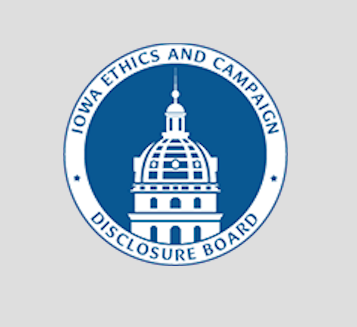The Iowa Ethics and Campaign Disclosure Board has a new website that is easier to navigate and complies with its own transparency rules. The board announced the site launch on January 15, a week before the next deadline for Iowa campaigns to report on their fundraising and spending.
Ryan Foley reported for the Associated Press last April that minutes from ethics board meetings since November 2016 had not been posted online, despite an administrative rule stating that board minutes “are available for viewing” at the board’s website. The board’s executive director Megan Tooker told Foley at that time, “the agency is no longer able to update its website and is building a new one, which it expects to launch in the next few weeks.”
Along with links to all board meeting agendas and minutes, the new site includes:
A page that will link to board actions, such as advisory opinions or reprimands and fines, is “coming soon.”
The searchable database for Iowa campaign contributions is now located on a different state website, under “campaign contributions received.” My initial impression is that it is much less functional than the old website. Searching for all donations by an individual no longer calls up results in reverse chronological order, so it is hard to spot all recent gifts. In addition, the engine has a field for surnames but not first names. Consequently, results for “Rastetter” or “Knapp” won’t allow users to easily determine whether all the contributions listed came from Bruce Rastetter (a major Republican donor) or Bill Knapp (a leading Democratic giver), or from their relatives. UPDATE: Tooker informed me that the old search engine is still accessible here.
The Iowa Ethics and Campaign Disclosure Board’s new website provides contact information for staff and short biographies of the six board members, but no details on how to contact the board directly.
Last year I turned to the Iowa Public Information Board after Tooker declined to release the private e-mail addresses her board members use to conduct official business. They do not have official “iowa.gov” e-mail accounts (a cost-saving move for the agency), and Tooker maintained that their private e-mails were not a public record. Eventually the Iowa Public Information Board approved an advisory opinion stating that agencies should not “withhold personal email addresses as confidential while continuing to use the personal email addresses regularly to conduct public business.”
At the ethics board’s July 2018 meeting, members agreed to establish new private accounts to use for official business and consented to Tooker providing those addresses to citizens upon request. However, longtime board chair James Albert stated that he would refuse on principle to read or respond to such communications.
For those wishing to contact ethics board members directly, here are the addresses Tooker sent me in August:
Board chair James Albert (R): albertIECDB@gmail.com
Vice chair John Walsh (D): jwalshdbq@gmail.com
Jonathan Roos (I): roosjonathan4@gmail.com
Mary Rueter (R): mlrueterIECDB@gmail.com
Carole Tillotson (R): carole.tillotson@drake.edu
Elaine Olson (D): ekolsoniecdb@gmail.com
The board members serve staggered six-year terms, none of which expire this year.

